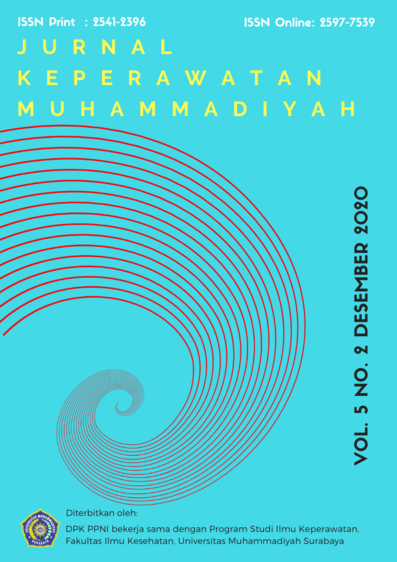Persepsi Keyakinan Kesehatan Memengaruhi Perilaku Wanita Usia Subur (WUS) Terhadap Pemeriksaan Inspeksi Visual Asetat (IVA)
DOI:
https://doi.org/10.30651/jkm.v5i2.5056Keywords:
Behavior, Cervical Cancer, Health beliefs, IVA examination, Women of childbearingAbstract
Cervical cancer is the most causa of deaths for women. Acetic Acid Visual Inspection Examination (IVA) is an effort to detect cervical cancer early. Conduct early detection is closely related to the perception of health beliefs (health belief). This study aimed to analyze the effect of perceived health beliefs on the behavior of women during childbearing age in conducting IVA examinations. The design of this study was observational analytic with a cross-sectional approach. The subjects of this study were 123 women who collected by simple random sampling. The variables of this study were the perception of health beliefs and behavior towards the IVA examination as early detection of cervical cancer. Data were collected by a questionnaire. The results showed that 57.7% of subjects had negative health belief perceptions, 60.2% had negative attitudes and 61.8% of subjects had never done an IVA examination. The results of the linear regression statistical test showed between the perception of health beliefs with attitudes obtained p-value = 0.00, the correlation value (R) = 0.951, the coefficient of determination = 0.904, between the perception of health beliefs with the act of conducting an IVA examination obtained p = 0.00, Correlation value (R) = 0.851 coefficient of determination = 0.724, It meant that there is an effect of perception of health beliefs on behavior (attitude & action) on IVA examination as early detection of cervical cancer. The implication in nursing is the need for collaboration between health cadres and the Public Health Center to increase socialization about IVA to women of childbearing age and family.
References
Alexius Dave. (2018). CERVIGRAM: Tak Semua Kanker Pink. Jakarta: diandra kreatif.
Ariani, S. (2015). Stop Kanker. Jakarta: Istana Media.
Ayuningtiyas, I. (2018). Hubungan Antara Dukungan Suami Dengan Sikap Istri Tes Iva Di Puskesmas Jaten II Kabupaten Karanganyar. PLACENTUM Jurnal Ilmiah Kesehatan Dan Aplikasinya, 6(2), 33–40. https://doi.org/10.13057/placentum.v
Azwar, S. (2015). Sikap Manusia : Teori Dan Pengukurannya. Yogyakarta: Pustaka pelajar.
Glanz, K., & Bishop, D. B. (2010). The Role of Behavioral Science Theory in Development and Implementation of Public Health Interventions. Annual Review of Public Health, 31(1), 399–418. https://doi.org/10.1146/annurev.publhealth.012809.103604
Glanz, K., Rimer, B. K., & Viswanath, K. (2008). Health behavior and health education: Theory, research, and practice. San fransisco: Jossey_bass.
Miftahil fauza. (2018). Faktor Yang Berhubungan Dengan Deteksi Dini Kanker Serviks. Jurnal Promosi Kesehatan Indonesia, Vol. 14 No(1). https://doi.org/DOI: 10.14710/jpki.14.1.68-80}
Mubarak, W. I. (2012). Promosi Kesehatan Untuk Kebidanan. Jakarta: Salemba medika.
Nayak, S., Roberth, S., & Chou-cung, S. (2011). Health belief about Osteoporosis and osteoporosis screening in older Women and Men. Health Educ J, 69(3), 267–276.
Ningrum, A. D., Titisari, I., Kundarti, F. I., & Setyarini, A. I. (2017). Issn : 2579-7301. Jurnal Ilmu Kesehatan, 5(2), 46–55.
Ningrum, D. (2016). Path Analisis Hubungan Pendidikan dan Konstruk Health Belief Model dengan Kinerja Kader pada Pengendalian Kasus Tuberkulosis Di Puskesmas Baki Kabupaten Sukoharjo.
Notoadmojo, A. (2014). Ilmu perilaku kesehatan. Jakarta: Rineka Cipta.
Orji, R., Vassileva, J., & Mandryk, R. (2012). Towards an Effective Health Interventions Design: An Extension of the Health Belief Model. Online Journal of Public Health Informatics. https://doi.org/10.5210/ojphi.v4i3.4321
Painter, J. E., Borba, C. P. C., Hynes, M., Mays, D., & Glanz, K. (2008). The use of theory in health behavior research from 2000 to 2005: A systematic review. Annals of Behavioral Medicine, 35(3), 358–362. https://doi.org/10.1007/s12160-008-9042-y
Riksani, R. (2016). Kenali kanker serviks sejak dini. Yogyakarta: Rapha.
Rio, S., Suci, T. (2017). Persepsi Tentang Kanker Serviks Dan Upaya Prevensinya Pada Perempuan Yang Memiliki Keluarga Dengan Riwayat Kanker. Jurnal Kesehatan Reproduksi, 4(3), 159–169.
Savitri, A. (2015). Kupas Tuntas Kanker Payudara, Leher Rahim & Rahim. Yogyakarta: Penerbit Pustaka Baru Press.
Shobeiri, F., Javad, M. T., Parsa, P., & Roshanaei, G. (2016). Effects of group training based on the health belief model on knowledge and behavior regarding the pap smear test in iranian women: A quasi-experimental study. Asian Pacific Journal of Cancer Prevention, 17(6), 2871–2876.
Tamtomo, D., Puspita, R. C., & Indarto, D. (2017). Health Belief Model for the Analysis of Factors Affecting Hypertension Preventive Behavior among Adolescents in Surakarta. Journal of Health Promotion and Behavior, 02(02), 183–196. https://doi.org/10.26911/thejhpb.2017.02.02.08
Wawan, A., & Dewi, M. (2010). Teori & Pengukuran Pengetahuan, Sikap Dan Perilaku. Yogyakarta: Nuha Medika.
Yanikkerem, E., Selçuk, A. K., & Esmeray, N. (2018). Cancer and Clinical Research Women ’ s Attitude and Beliefs about Cervical Cancer and Pap Smear Test by using the Health Belief Model. International Journal of Cancer and Clinical Research, 5(3), 1–9. https://doi.org/10.23937/2378-3419/1410102
Downloads
Published
Issue
Section
License
- Penulis tetap memegang hak atas karyanya dan memberikan hak publikasi pertama kepada jurnal ini yang secara simultan karya tersebut dilisensikan di bawah:Â Creative Commons Attribution-ShareAlike 4.0 International (CC BY-SA 4.0)













